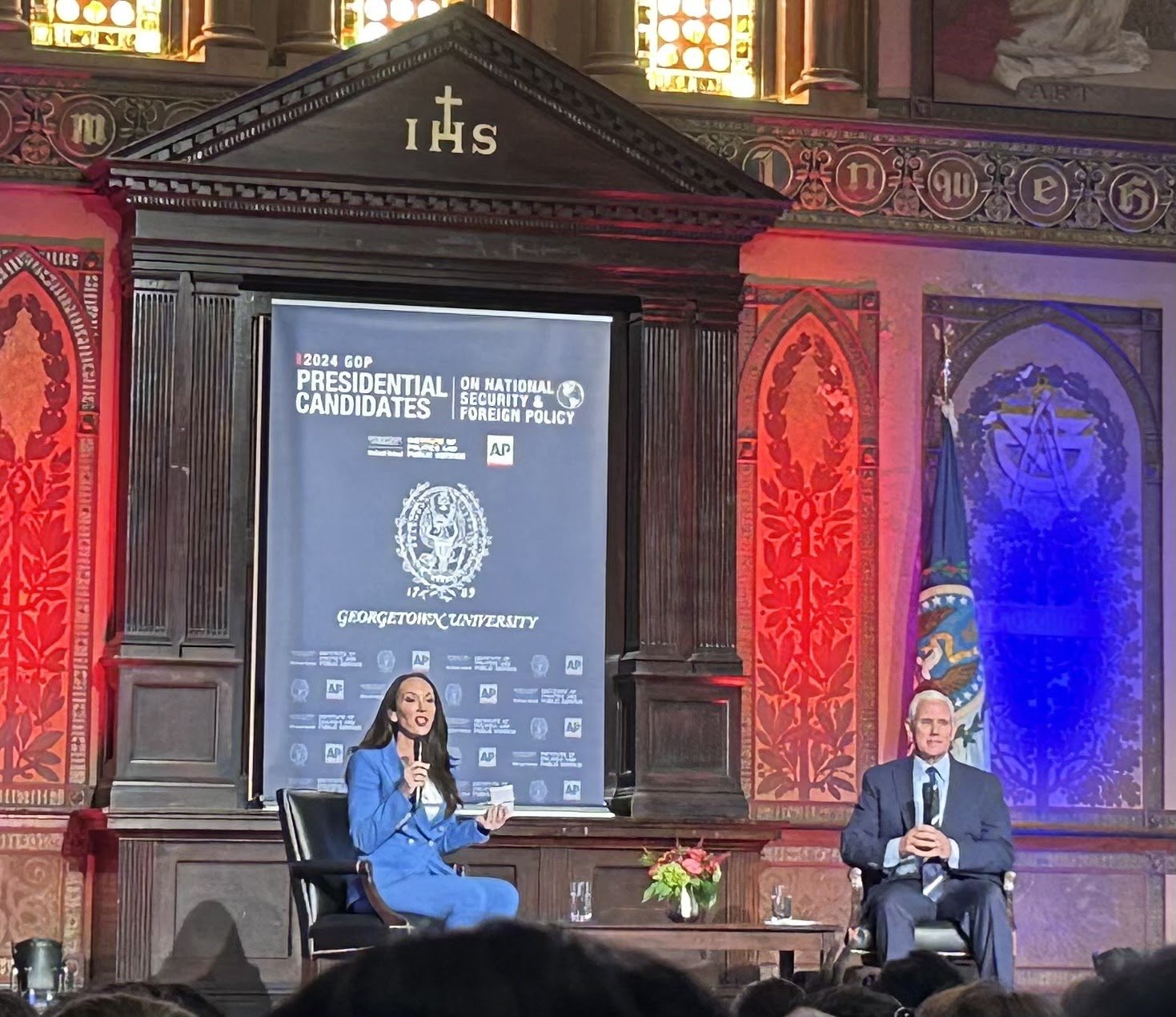Former Vice President Mike Pence Lays Out Foreign Policy Vision in Georgetown Discussion
Former Vice President Mike Pence took questions from Georgetown students in Gaston Hall (Author’s own work).
Former Vice President Mike Pence took the stage at Gaston Hall in a forum with Georgetown students on October 3, where he laid out his vision for U.S. foreign policy. The 2024 Republican presidential hopeful presented a traditional Republican foreign policy platform in his responses to student and moderator questions, laying out an interventionist platform of peace through military strength.
Georgetown University's Institute of Politics and Public Service, in conjunction with Clemson University, the University of New Hampshire, and Iowa State University, is hosting a series of conversations with the candidates vying for the GOP nomination in conjunction with the Associated Press. Pence, who has served as Vice President, Governor of Indiana, and Congressman, was the first presidential candidate to participate in the series.
The questions asked by university students and the moderator, AP reporter Meg Kinnard, discussed the war in Ukraine, the rise of China, and the conflict in Nagorno-Karabakh, among other topics. The discussion remained mostly civil, despite potential ideological rifts among the speaker and audience.
Pence cautiously answered each question put by AP reporter Meg Kinnard and by students, often pausing before his responses, attempting to project strength and poise while laying out his plans to tackle the United States’ top foreign policy questions. However, he deflected questions about his top priorities, Iran, and the conflict in Nagorno-Karabakh.
Kinnard focused the early discussion on the war in Ukraine. Pence reiterated his support for sending additional weapons to Ukraine, an increasingly controversial position within his Republican Party, with 104 GOP members of the House of Representatives recently voting for cuts to that aid. Despite Pence’s support for Ukraine, the former vice president rejected President Joe Biden’s framing of the war as a fight to defend democracy, arguing that the United States should instead defend Ukraine because “it's in our national interest to do so.”
He argued that a lack of support for Ukraine could have implications in the Asia-Pacific, noting, “I really do believe that if Russia overruns Ukraine, that’ll give a green light to China to move against Taiwan.”
Pence argued that a military buildup was the right course of action to deter China’s threat to U.S. interests. He advocated maintaining a robust fleet of 355 ships and ballistic submarines alongside economic measures to protect American businesses and intellectual property, reiterating policies the previous Trump administration promised.
Pence also verbally attacked his 2024 rivals. During a segment on the popular social media platform TikTok, Pence reiterated calls to ban the app and took a jab at a rival candidate, businessman Vivek Ramaswamy, for using the app. When pressed if his plan to ban the app was feasible, Pence hedged, “I don’t know about realistic, but it's the right idea.”
The presidential hopeful targeted former President Donald Trump for a Truth Social post demanding that retiring chairman of the Joint Chiefs of Staff Mark Milley should be executed for treason, saying, “Frankly, what Donald Trump said about him in that tweet, about treason and death, was utterly inexcusable.”
However, Pence’s primary criticisms targeted President Joe Biden. He argued that the 2021 U.S. withdrawal from Afghanistan created openings for instability around the world. Pence claimed that he was running for president because “I think that this country is in a lot of trouble. I think Joe Biden has weakened this country at home and abroad.” He repeated the argument that he could present the strong leadership that Biden lacks throughout the hour-long forum.
Pence pointed to the United States’ $33 trillion national debt as the main obstacle in U.S. foreign policy, leaning into the rhetoric of a deficit hawk. However, Pence’s platform advocating peace through strength, fiscal responsibility, and support for American allies has found little support in the Republican Party, with 40 percent of Republicans agreeing that too much aid is being sent to Ukraine.
Pence’s traditional conservative foreign policy values may be increasingly outdated in a Republican Party now prone to embrace isolationism, leaving Pence behind in the primary race at around four percent support nationally. The former Vice President projects a vision of a muscular, interventionist America, but it remains to be seen whether GOP primary voters will embrace him and that vision.

